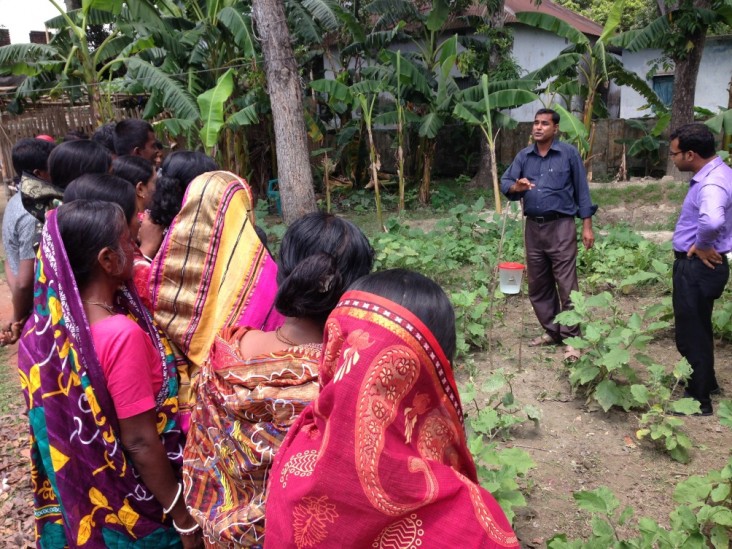
Asia Regional Context
Despite gains from the Green Revolution and the recent economic growth of the region, Asia is still home to nearly two-thirds of the world’s poor and undernourished. This disparity suggests a need for a focus on inclusive growth where the needs of under-resourced populations are specifically addressed in development projects. Asia is also projected to be most vulnerable to extreme weather events and the negative effects of climate change, which further expose the poorest segments of society – half of whose household income, on average, goes to buying food.
With a great diversity of economies and cultures, Asia provides a myriad of opportunities for neighboring countries to share ideas, information and technologies across its borders. Facilitating this flow of information and products can speed the transition of poor farmers into sustainable market systems.
Regional partnerships additionally support this integration to develop and meet the demand for improved practices and technologies. Better communication and exchange of information between governments, universities, the private sector and civil society organizations will allow countries to share their experiences and innovative solutions.
What We’re Doing
Through the USAID-led Feed the Future Program (the U.S. Government’s Global Hunger and Food Security Initiative), we have invested over $3.5 billion around the world to support country-led programs that tackle poverty, hunger and under-nutrition.
Agriculture and food security are vital to the continued economic growth of most South and Southeast Asian countries, and in particular to the Feed the Future countries: Bangladesh, Burma, Cambodia, India, Nepal and Timor Leste. USAID’s Feed the Future Asia Regional program aims to improve regional agricultural trade, access to new technologies and enhanced networking between countries across the region to alleviate poverty and ensure sustainability in food security.
At the USAID Regional Development Mission for Asia, Feed the Future involves:
Strengthening Regional Platforms
We work with regional institutions, such as the Association of Southeast Asian Nations (ASEAN), the Mekong Institute, universities, development organizations and the private sector to strengthen agriculture and food security. Regional organizations provide a platform for dialogue and action on food security issues, such as the creation of regional standards and streamlined policies which are essential to efficient agricultural trade.
Creating Linkages between Diverse Partners and Building Local Capacity
We are connecting Asia’s development stakeholders to act as catalysts for networking and partnerships among businesses governments, multilaterals, civil society organizations, farmers and scientists. We are strengthening knowledge dissemination and access to technologies across the region and establishing partnerships with Asian intergovernmental organizations.
What We’ve Achieved
- USAID’s AgLEARN project, the Agricultural Learning Exchange for Asian Regional Networking, provides a platform for regional collaboration in research, training and exchange of innovative food security technologies in Bangladesh, Cambodia and Nepal with support from organizations in India and Thailand. The project has trained hundreds of farmers on novel techniques and tested many new technologies with local farmers in their fields. After discovering the most useful tools, as evaluated by the farmers, the project is already seeing positive results.
- USAID completed a South Asia Regional Food Security Policy Assessment in 2014 to improve regional coordination on agricultural trade policies and public-private sector engagement in Bangladesh and Nepal. The Southeast Asia Agricultural Inputs assessment was completed in 2015 and presented to policymakers at the Lower Mekong Initiative pillar meetings in Bangkok.
- A grant to the Mekong Institute created the Lower Mekong Initiative Food Security Donor Mapping Database in 2015. The interactive website and map aim to capture all of the donor-funded food security projects in the Lower Mekong region to increase transparency, communication and coordination. Although the project is ended, the Mekong Institute will maintain the website as an important platform for knowledge, generating regular snapshots and updates on the food security situation in the region.
- Regional Agricultural Trade Environment (RATE) assessments in seven countries in Asia have identified sixteen specific regulations, laws and practices related to the streamlining of regional trade for ASEAN member states for revision (see below for link).
- USAID’s Gender & Food Security Report identifies ways to bring more women into trade and markets. We are studying the roles of women in agriculture and aquaculture value chains to understand the constraints and opportunities presented to women as farmers, processors, exporters, retailers, farm workers or managers of households. We have also facilitated a regional gender workshop focusing on women entrepreneurs and women in agriculture.
- USAID assisted in the drafting of the Laos food law.
Regional Agricultural Trade Environment Reports
The Regional Agricultural Trade Environment activities, implemented by the USAID Maximizing Agricultural Revenue through Knowledge, Enterprise Development and Trade Project, are tools for examining the agricultural trade enabling environments of participating countries in regional organizations for the purpose of helping regions streamline and strengthen their approaches to cross-border trade and food security. The assessment reports are grounded in USAID’s commitment, through its Feed the Future initiative, to facilitate the integration of farmers and rural industries into the full chain of production, from "farm to fork," enabling them to better connect with agricultural trade and market opportunities.
Launched in April 2012, the assessment reports cover seven of the 10 member states of the Association of Southeast Asian Nations (ASEAN). It examines a range of agriculture and trade-related policies, laws, institutions and social dynamics that impact the environment for trade, both with respect to international markets, and critically, among ASEAN member states themselves. To view the reports, click here.







Comment
Make a general inquiry or suggest an improvement.